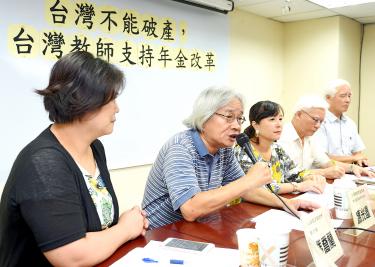A number of civic groups yesterday said that President Tsai Ing-wen (蔡英文) should be wary of an impending financial crisis facing the nation if the pension system does not undergo a systematic reform.
Public servants who are set to launch a parade tomorrow in protest of pension reform claim that they are against “arbitrary” changes to pension rules, Northern Taiwan Society deputy chairman Lee Chuan-hsin (李川信) told a news conference.
However, what they really mean is “do not pinch one penny from me,” Lee said, adding that this attitude is similar to those adopted by public servants during failed pension reform in 2002.
Lee, a teacher who has been retired for 10 years, said he often does not tell people that he was a teacher out of concern they might resent him because of the generous pension he receives — NT$85,000 (US$2,656) per month before the 18 percent preferential interest rate for public servants was canceled.
Northern Taiwan Society chairman Chang Yeh-sen (張葉森) said that Tsai’s campaign promise of pension reform to salvage the nation from bankruptcy was a major factor behind her emphatic election win.
“Tsai must fulfill that pledge, otherwise she will not stand a chance of re-election and, in the worst-case scenario, could be deposed,” Chang said.
Union of Taiwanese Teachers director-general Hsiao Hsiao-ling (蕭曉玲) said that many teachers are in favor of pension reform, even though they represent part of the vested interest.
“They said that they would rather be given smaller pensions. Otherwise, when the nation goes bankrupt, there will be no future for their children,” Hsiao said.
She panned the exorbitant income replacement ratio enjoyed by teachers at public schools.
Hsiao said that she would need to pay about NT$1.5 million into the mandatory pension fund throughout her career.
She said that under the current system, she would not only be able to reclaim the NT$1.5 million, but also receive between NT$60,000 and NT$70,000 every month in her retirement, meaning that she would be able to offset what she had paid in just over two years.
“Is there any nation in the world that offers public servants such great welfare?” she asked.
Hsiao said that she supports breaking down the barriers between different professions and setting a single ceiling for pensions, thereby achieving a balance in the pension received by laborers and public servants.
Union member and pension reform committee member Neil Peng (馮光遠) lambasted what he said was a complacency displayed by public servants who oppose pension reform.
“Some people think that because they used to be a general or a manager, they ought to live like a general or a manager in their retirement,” he said.
However, what these people have forgotten is that in the nation’s formative years, a job in the public sector was considered less desirable, which prompted the government to inject huge amounts of capital to provide incentives for people to take up public posts, which has made them the “elite” they are, Peng said.
“The government cared so much about you when you were the minority. However, have you ever cared about the ‘new’ minority?” Peng said, criticizing those who oppose reform as “greedy” and “selfish.”
Source: Taipei Times - 2016/09/02





















